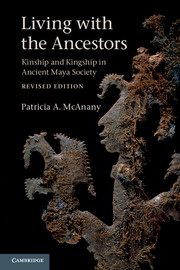Book contents
- Frontmatter
- Dedication
- Contents
- Figures and Table
- Preface
- Living with the Ancestors: Kinship and Kingship in Ancient Maya Society
- Introduction to the Revised Edition
- ONE A Point of Departure
- TWO Ancestor Veneration and Lineage Organization in the Maya Region
- THREE Creating a Genealogy of Place
- FOUR Lineage as a Crucible of Inequality
- FIVE Kin Groups and Divine Kingship in Lowland Maya Society
- SIX Ancestors and Archaeology of Place
- POSTSCRIPT The Future of the Ancestors and the Clash between Science and Human Rights
- Notes
- References Cited
- Index
FOUR - Lineage as a Crucible of Inequality
Published online by Cambridge University Press: 05 July 2014
- Frontmatter
- Dedication
- Contents
- Figures and Table
- Preface
- Living with the Ancestors: Kinship and Kingship in Ancient Maya Society
- Introduction to the Revised Edition
- ONE A Point of Departure
- TWO Ancestor Veneration and Lineage Organization in the Maya Region
- THREE Creating a Genealogy of Place
- FOUR Lineage as a Crucible of Inequality
- FIVE Kin Groups and Divine Kingship in Lowland Maya Society
- SIX Ancestors and Archaeology of Place
- POSTSCRIPT The Future of the Ancestors and the Clash between Science and Human Rights
- Notes
- References Cited
- Index
Summary
In a definitional sense, the residence is the primary place where ancestral genealogy is encoded both ritualistically and corporally. Relationally, however, the ancestors, through the structure of the lineage, serve to underwrite and reinforce social and economic inequality, particularly in large, expansive households. Many current anthropological theories of social inequality stress the emergence of class structure and warfare as primary factors of inequality. Lineage organization is more frequently analyzed from the perspective of group inclusiveness rather than as a crucible of inequality. Yet among groups such as the Mae Enga of highland New Guinea who are generally not classified as societies with class stratification or hereditary leadership positions, there is, in fact, clearly a tremendous amount of social and economic inequality (Meggitt 1965). This type of inequality, which emerges from the spirit of the ancestors and resides in the heart of kin groupings, is the subject of this chapter. This approach is distinct from studies of inequities which examine the consequences of the crystallization of hereditary positions of authority and political centralization. In many respects, this is an analysis of inequality at a very personal level—within the residential compound, within the lineage, and between lineages. The goal is not to contrast chiefdoms with states or ranked with stratified societies—that is, to artificially or heuristically constrain the study of inequality to evolutionary pigeonholes.
- Type
- Chapter
- Information
- Living with the AncestorsKinship and Kingship in Ancient Maya Society, pp. 111 - 124Publisher: Cambridge University PressPrint publication year: 2014



